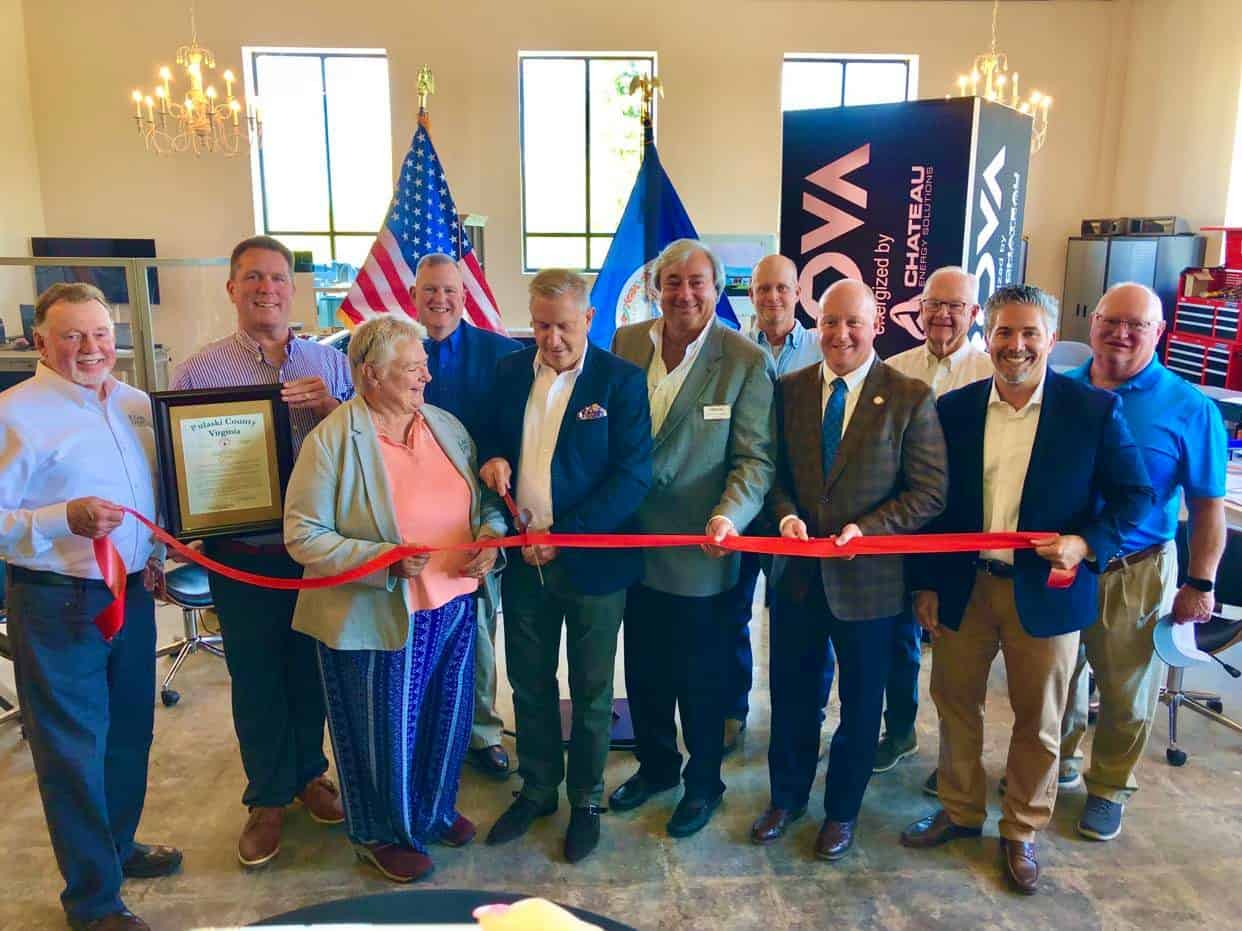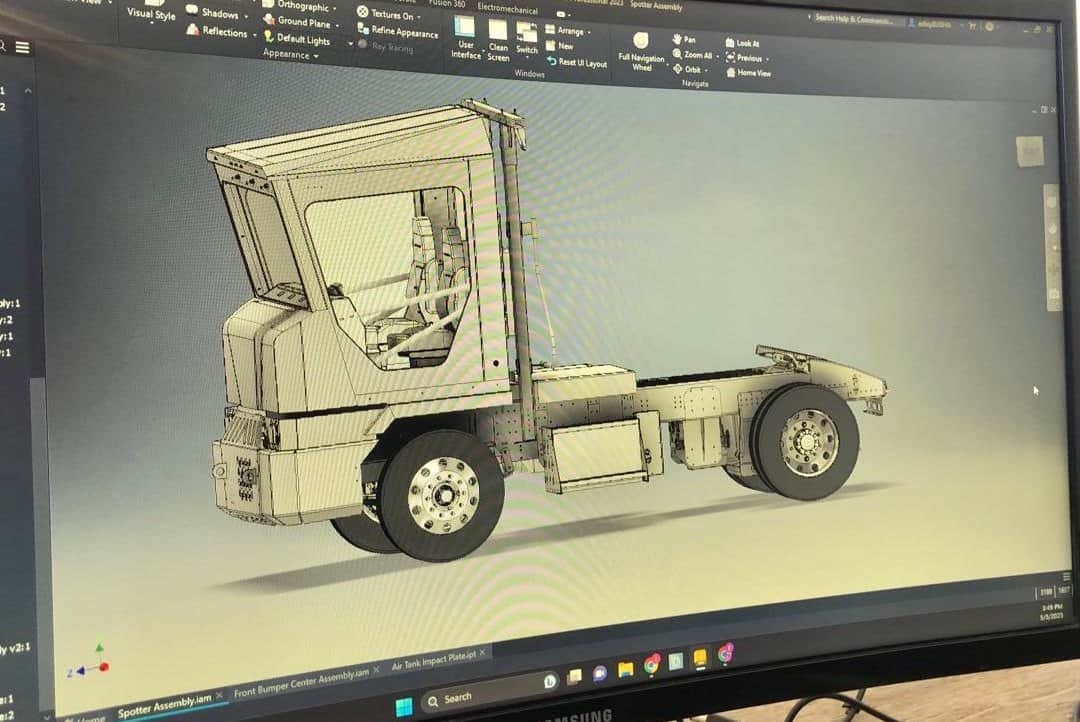Trova makes old Newbern Elementary its new HQ
 William Paine/The Patriot
William Paine/The Patriot
Trova founder and CEO Patrick Collignon cuts the ribbon for his company’s new headquarters at the former home the Newbern Elementary School

“Spotter” truck design – In addition to refitting diesel-powered trucks with electric motors, Trova engineers are designing Spotter trucks, which are used to haul freight at ports around the globe.
By WILLIAM PAINE
The Patriot
On the first Friday of May 2023, Trova Commercial Vehicles officially announced that the old Newbern Elementary School would the serve as the company’s new headquarters. County and state officials came to a ribbon cutting ceremony to mark the occasion in this recently refurbished structure, which once served as an elementary school but in recent years had fallen into disrepair.
Bill Cunningham, who came as a representative for the Pulaski County Economic Authority (EDA), served as the emcee of the event. Both the EDA and the Pulaski County administration were deeply involved in making this relocation a reality.
“This is truly amazing and the start of something that’s going to be absolutely fantastic for not only Pulaski County, but for the New River Valley,” said Delegate Jason Ballard, as he took his turn on the microphone. “Trova is an innovator. It has the potential and will transform the commercial vehicle industry in the Commonwealth of Virginia. I have absolutely no doubt about that statement.”
“Trova is Latin and it means, to find,” stated Patrick Collignon, founder and CEO of Trova Commercial Vehicles. “It comes from the more famous statement Cerca trova. Seek and you will find … and we will find solutions to help accelerate the market acceptance of zero emission commercial vehicles. That’s our objective.”
One of Trova’s main priorities is developing the technology to replace the diesel engines on used medium range commercial trucks with electric motors. To that end, Trova developed a prototype electric truck that Pulaski County supervisors were given a chance to test drive. Chairwoman of the board, Laura Walters, talked about taking her turn behind the wheel.
“I’m unofficially going to claim the land speed record for electric trucks,” said Walters with a laugh. “This was one of the most fun and exciting things I’ve done as a supervisor.”
Walters then went on to mention the building’s proximity to the historic Wilderness Road.
“That was the way out west and for many it represented a new beginning along with a new set of challenges. Trova is also embarking on new territories today, while moving forward with technologies for tomorrow.”
“We sent our boys to school here,” said county supervisor Dirk Compton. “This building has been empty for a while now. The school board gave it to us and there was some damage to it. People were throwing rocks at windows and things like that and it was painful … we were even contemplating just bulldozing it down. To have Trova come along and join with us on this was truly wonderful.”
“If you’re a passionate about loving the environment, there’s nothing better than reclaiming the property,” said Collignon. “It’s like replacing an old truck to make it a brand-new truck. One reason I chose the school was that I was fascinated by the view. It’s an old school, so it has its constraints but it’s like a marriage … we found the right match. This is a perfect place for a design studio. A beautiful setting and still very close to interstate connectivity.”
After the speeches, the red ribbon provided by the Pulaski County Chamber of Commerce was cut and Collignon and his engineers made themselves available for questions.
Patrick Collignon worked many years as a top-level executive at Volvo trucks before founding Trova.
“The industry that I’ve worked in throughout my entire career is in the midst of its largest paradigm shift since Henry Ford invented mass production,” said Collignon. “I think everybody is aware that there will be a transition from traditional internal combustion engines towards zero emission vehicles. Forget the environmental aspect, the story is going to be about wealth and I think at the end of the day, everybody here involved with economic development is going to be really happy seeing that the wealth happens here, not in Palo Alto, California or Texas.”
Collignon admitted that if someone had told him ten years ago that electric trucks would be the future for commercial transportation, he would have rolled on the floor laughing … but times have changed.
“Repowering is one of those new innovative market segments that had no reason to exist yesterday but now when you have a perfectly good truck and its diesel engine is coming to the end of life, we can provide a high voltage driveline architecture that we can put in that truck,” said Collignon. “Now we can give that truck another 10 years of useful life at a significantly lower cost than if you have to buy a completely new electric commercial vehicle.”
Engineers at Trova are also designing prototypes for electric “spotter” trucks, which are the vehicles that move freight around commercial ports throughout the world.
“We start by developing a concept vehicle,” Collignon explained. “In our case it was a fully operational truck. We call it an A build. Then we evolve to a more engineered solution. That’s a B build. We are in the place where we’re building B built vehicles. From there, we go to preproduction. You don’t come up with a new car or truck by building just one vehicle.”
Components designed and built to serve as the working parts of these electric vehicles were placed around the room.
“This is a high voltage auxiliary module and this is already C built,” said Collignon as he pointed to a complex piece of machinery. “So, this is ready to go into production.”
According to Collignon, there are about 5 million heavy duty commercial vehicles currently in operation in the U.S. but since battery powered trucks can only go so far without recharging, producing electric powered long-haul trucks is not yet an option. That still leaves 1.4 million medium and short-range trucks that can feasibly be transformed into electric powered vehicles.
Though the headquarters and design center of Trova are now in Newbern, Trova is a multi-stakeholder enterprise consisting of more than 20 companies.
“Trova is much stronger than a standalone entity,” said Collignon. “All are engaged in what we do. Patrick Enterprise in Giles County is a strategic partner that works with metal forming. Radford based Manufacturing Service Solutions are the prototype builders. Net Group in North Carolina is our high voltage engineering partner. Concept in Sweden is our software development partner. Chateau Energy Solutions (Atlanta) works with charging infrastructure. Camrett Logistics in Dublin is one of our early investors and we’re using their space to make Prototype B and the list goes on.”
According to Collignon, Trova is nearing the time when these electric commercial vehicles can be mass produced but he has not yet chosen a site for the production facility.
“We’re going to come to the point where we have to decide where to produce,” Collignon revealed. “We’re in conversations with many different locations because as I said during my short speech, the question is, is Virginia ready for EV?”
For those in attendance at Trova’s ribbon cutting ceremony, the answer would most definitely be “yes.”
